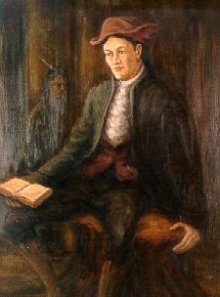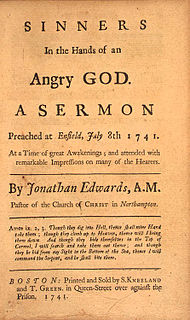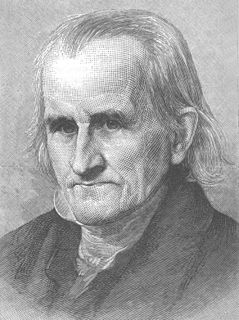Related Research Articles

Evangelicalism, also called evangelical Christianity, or evangelical Protestantism, is a worldwide interdenominational movement within Protestant Christianity that maintains the belief that the essence of the Gospel consists of the doctrine of salvation by grace alone, solely through faith in Jesus' atonement. Evangelicals believe in the centrality of the conversion or "born again" experience in receiving salvation, in the authority of the Bible as God's revelation to humanity, and in spreading the Christian message. The movement has long had a presence in the Anglosphere before spreading further afield in the 19th, 20th and early 21st centuries.
The Great Awakening refers to a number of periods of religious revival in American Christian history. Historians and theologians identify three, or sometimes four, waves of increased religious enthusiasm between the early 18th century and the late 20th century. Each of these "Great Awakenings" was characterized by widespread revivals led by evangelical Protestant ministers, a sharp increase of interest in religion, a profound sense of conviction and redemption on the part of those affected, an increase in evangelical church membership, and the formation of new religious movements and denominations.

Jonathan Edwards was an American revivalist preacher, philosopher and Congregationalist theologian. Edwards is widely regarded as one of America's most important and original philosophical theologians. Edwards' theological work is broad in scope, but rooted in the pedobaptist Puritan heritage as exemplified in the Westminster and Savoy Confessions of Faith. Recent studies have emphasized how thoroughly Edwards grounded his life's work on conceptions of beauty, harmony, and ethical fittingness, and how central The Enlightenment was to his mindset. Edwards played a critical role in shaping the First Great Awakening, and oversaw some of the first revivals in 1733–35 at his church in Northampton, Massachusetts. His theological work gave rise to a distinct school of theology known as the New England theology.

David Brainerd was an American Presbyterian minister and missionary to the Native Americans who had a particularly fruitful ministry among the Delaware Indians of New Jersey. During his short life he was beset by many difficulties. As a result, his biography has become a source of inspiration and encouragement to many Christians. Missionaries such as William Carey and Jim Elliot, and Brainerd's cousin, the Second Great Awakening evangelist James Brainerd Taylor (1801–1829) have been motivated by the ministry of David Brainerd.

Cephas Washburn was a noted Christian missionary and educator who worked with the Cherokee of northwest Arkansas and eastern Oklahoma.

A Christian mission is an organized effort to spread Christianity to new converts. Missions involve sending individuals and groups across boundaries, most commonly geographical boundaries, to carry on evangelism or other activities, such as educational or hospital work. Sometimes individuals are sent and are called missionaries. When groups are sent, they are often called mission teams and they do mission trips. There are a few different kinds of mission trips: short-term, long-term, relational and those that simply help people in need. Some people choose to dedicate their whole lives to mission. Missionaries preach the Christian faith, and provide humanitarian aid. Christian doctrines permit the provision of aid without requiring religious conversion. However, Christian missionaries are implicated in the genocide of indigenous peoples. Around 100,000 native people in California, U.S., or 1/3 of the native population, are said to have died due to missions.

William Carey was an English Christian missionary, Particular Baptist minister, translator, social reformer and cultural anthropologist who founded the Serampore College and the Serampore University, the first degree-awarding university in India.

The First Great Awakening or the Evangelical Revival was a series of Christian revivals that swept Britain and its thirteen North American colonies in the 1730s and 1740s. The revival movement permanently affected Protestantism as adherents strove to renew individual piety and religious devotion. The Great Awakening marked the emergence of Anglo-American evangelicalism as a trans-denominational movement within the Protestant churches. In the United States, the term Great Awakening is most often used, while in the United Kingdom the movement is referred to as the Evangelical Revival.
Gideon Hawley (1727–1807) was a missionary to the Iroquois Indians in Massachusetts and on the Susquehanna River in New York.
Sereno Edwards Dwight was an American author, educator, and Congregationalist minister, who served as Chaplain of the Senate.

David Dudley Field I was an American Congregational clergyman and historical writer. He was born in East Guilford, now Madison, Connecticut on May 20, 1781, the son of Timothy Field, an officer during the American Revolution. He graduated from Yale in 1802, and received Doctorate in Divinity degree from Williams College. He held pastorates at Haddam, Connecticut, and Stockbridge, Massachusetts. He wrote A History of the Town of Pittsfield, in Berkshire County, Massachusetts (1814), A Statistical Account of the County of Middlesex in Connecticut (1819), The Genealogy of the Brainerd Family, in the United States, with Numerous Sketches of Individuals (1857), Centennial Address with Historical Sketches of Cromwell, Portland, Chatham, Middle-Haddam, Middletown and its Parishes (1853), among other works. He married Submit Dickinson (1782-1861) in 1803, daughter of Noah Dickinson, who was a veteran of the French and Indian War and served in the Continental Army. They both raised nine children, four of whom achieved national prominence. He is buried at the Stockbridge Cemetery in Stockbridge, Massachusetts.
George Mish Marsden is an American historian who has written extensively on the interaction between Christianity and American culture, particularly on Christianity in American higher education and on American evangelicalism. He is best known for his award-winning biography of the New England clergyman Jonathan Edwards, a prominent theologian of Colonial America.
Elihu Spencer was an American clergyman who served as a chaplain during the French and Indian War. During the American Revolution, he was invited to North Carolina by that colony's provincial congress to convince loyalist congregations to join the patriot cause.

Asahel Nettleton was an American theologian and Evangelist from Connecticut who was highly influential during the Second Great Awakening. The number of people converted to Christianity as a result of his ministry was estimated by one biographer at 30,000. He participated in the New Lebanon Conference in 1827, during which he and Lyman Beecher opposed the teachings of Charles Grandison Finney.

Christianity in the 18th century is marked by the First Great Awakening in the Americas, along with the expansion of the Spanish and Portuguese empires around the world, which helped to spread Catholicism.

The Brainerd Mission was a Christian mission to the Cherokee in present-day Chattanooga, Tennessee. The associated Brainerd Mission Cemetery is the only part that still remains, and is listed on the National Register of Historic Places.

Christian revivalism is increased spiritual interest or renewal in the life of a church congregation or society, with a local, national or global effect. This should be distinguished from the use of the term "revival" to refer to an evangelistic meeting or series of meetings. Proponents view revivals as the restoration of the church itself to a vital and fervent relationship with God after a period of moral decline.
Mark Tross is a Christian pastor, radio and television personality, columnist, and former disk jockey residing in New Mexico, USA.

Sarah Edwards was an American missionary, and the wife of theologian Jonathan Edwards. Her husband was initially drawn to her spiritual openness, direct relationship with God, and periods of spiritual ecstasy. As a theological student at Yale, he had longed to have a personal relationship with God. His wife's experiences, similar to those of Saint Teresa of Ávila, profoundly affected his religious life and the formation of the New Light. She was a model of spirituality during the Great Awakening of the early 18th century. Her experiences of religious ecstasy were documented in Jonathan Edward's work, Some Thoughts Concerning the Present Revival of Religion in New England.
Catharine Brown was a Cherokee woman and missionary teacher at Brainerd Mission School. She was the mission’s first Cherokee convert to Christianity and the first Native American woman to see many of her writings extensively published in her lifetime.
References
- ↑ J.M. Sherwood (1884). Memoirs of Rev. David Brainerd, missionary to the Indians of North America. Funk & Wagnalls. p. xviii. Retrieved 6 September 2009.
An Account of the Life of the Late Rev. David Brainerd.
- ↑ "The Works of Jonathan Edwards, Vol. 7". Yale University Press. Retrieved 6 September 2009.
- ↑ "Jonathan Edwards's Most Popular Work: "The Life of David Brainerd" and Nineteenth-Century Evangelical Culture". Joseph Conforti. Retrieved 6 September 2009.
- ↑ "Life of David Brainerd (1749)". The Jonathan Edwards Center at Yale University. Retrieved 6 September 2009.